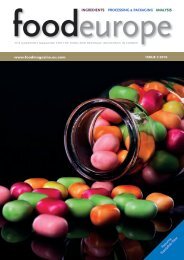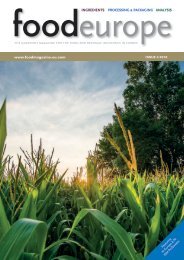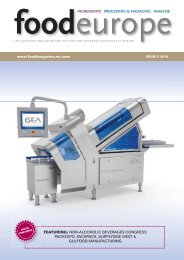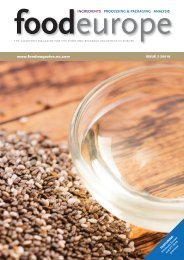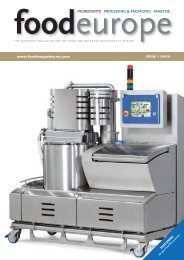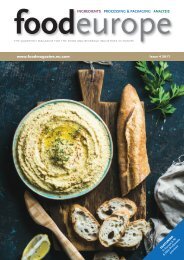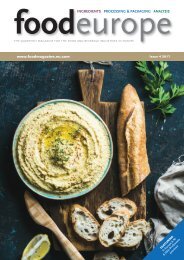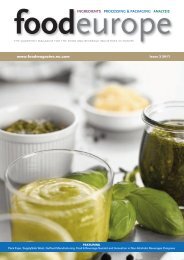food
You also want an ePaper? Increase the reach of your titles
YUMPU automatically turns print PDFs into web optimized ePapers that Google loves.
42<br />
ingredients<br />
The work of the Functional Foods Forum<br />
The University of Turku has a long tradition in the research and development of <strong>food</strong>s, and<br />
therefore has a breadth of knowledge in the effects of different <strong>food</strong>stuffs in maintaining and<br />
promoting health and wellbeing. As a special unit of the university, working directly under the<br />
auspices of the Rector, the Functional Foods Forum (FFF) strengthens and enhances<br />
multidiscliplinary skills to augment that know-how.<br />
Apart from <strong>food</strong> technology – a<br />
function that the unit outsources<br />
to a local, specialist polytechnic –<br />
there is practically every kind of<br />
<strong>food</strong> specialist represented at the<br />
University, including<br />
paediatricians, chemists,<br />
dieticians, lawyers and<br />
microbiologists. This<br />
multidisciplinary approach is<br />
particularly important in the <strong>food</strong><br />
industry, which embraces many<br />
different specialties, all of which<br />
have a mutual impact.<br />
Approximately half of the Forum’s<br />
research projects are publicly<br />
funded, and it continues the long<br />
tradition of Turku University<br />
research on xylitol, the noncariogenic<br />
sweetener. The<br />
highlight of xylitol research<br />
includes the dental researchers’<br />
pioneering work on xylitol and<br />
dental health. This has resulted in<br />
the development of chewing gums<br />
and candy products that have<br />
proven their ability to reduce the<br />
risk of caries when consumed as<br />
part of the normal daily diet.<br />
Current work has focused on<br />
intestinal microbiota research,<br />
probiotics and prebiotics, and their<br />
efficacy as components of<br />
functional <strong>food</strong>s. Nutritional<br />
research, and especially nutrition<br />
for children, also enjoys a long<br />
tradition in Turku.<br />
The structure of the FFF<br />
FFF is a special research unit<br />
within the University, which<br />
focuses on applying nutritional,<br />
<strong>food</strong> science and medical<br />
knowledge on the research and<br />
development of functional <strong>food</strong>s. It<br />
shares its expertise on <strong>food</strong>related<br />
research and knowledge<br />
with different units of the<br />
University and also imparts that<br />
expertise and increasing degree of<br />
specialisation to research centres<br />
focusing on functional <strong>food</strong><br />
science in Finland and Europe. The<br />
core unit now has six different<br />
research teams and team leaders,<br />
selected from within the university<br />
at the time the unit was set up:<br />
■<br />
Lignan and phytoestrogen<br />
group: focusing especially on<br />
mechanisms to reduce the risk<br />
of cancers (Dr Sari Mäkelä).<br />
This group researches<br />
primarily into plant-based<br />
lignans and their positive<br />
effects on prostate and breast<br />
■<br />
■<br />
■<br />
■<br />
cancer. This group has<br />
completed basic research and<br />
is likely to move into the<br />
clinical phase shortly.<br />
Nutrition, Allergy, Mucosal<br />
immunology and Intestinal<br />
microbiota (NAMI): focusing<br />
on nutritional means of<br />
alleviating symptoms and<br />
reducing the risk of atopic<br />
disease (Professor Erika<br />
Isolauri). This is probably the<br />
largest clinical group within the<br />
Forum.<br />
Molecular <strong>food</strong> diagnostics:<br />
focusing on rapid microbial<br />
diagnostics, (Professor Timo<br />
Lövgren).<br />
Food and intestinal<br />
immunology research in infants<br />
and children (Dr Marko<br />
Kalliomäki),<br />
Sensory assessment and<br />
evaluation (Dr Mari Hakala).<br />
This group has a particularly<br />
close relationship with the<br />
diagnostics group above,<br />
working together to produce<br />
<strong>food</strong> that is both healthy and<br />
provides a superior sensory<br />
experience.<br />
Healthy chewing!<br />
Xylitol is a 5-carbon sugar alcohol (polyol) that looks and tastes like sugar. It was developed in Finland during<br />
the World War ll to help the country cope with the sugar shortage and a factory was established to produce<br />
it. After the war the factory fell into disuse, but interest in the product remained, particularly with dental<br />
specialists who undertook research into the properties of the substance. The first studies were released in<br />
the late sixties and they indicated that xylitol might be anti-cariogenic. At the end of the sixties, Turku<br />
University undertook the first two-year clinical studies, substituting xylitol chewing gum for sugar chewing<br />
gum; and thereafter, xylitol has been very prominent both in dental and <strong>food</strong> research. Today, over 90% of the<br />
chewing gum sold in Finland contains xylitol instead of sugar, automatically providing health benefits for its<br />
consumers.<br />
<strong>food</strong> spring 2005




